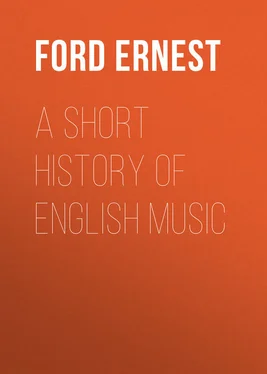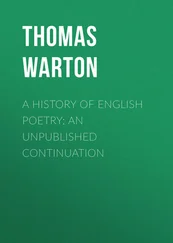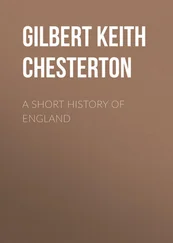Ernest Ford - A Short History of English Music
Здесь есть возможность читать онлайн «Ernest Ford - A Short History of English Music» — ознакомительный отрывок электронной книги совершенно бесплатно, а после прочтения отрывка купить полную версию. В некоторых случаях можно слушать аудио, скачать через торрент в формате fb2 и присутствует краткое содержание. Жанр: music_dancing, foreign_antique, foreign_prose, на английском языке. Описание произведения, (предисловие) а так же отзывы посетителей доступны на портале библиотеки ЛибКат.
- Название:A Short History of English Music
- Автор:
- Жанр:
- Год:неизвестен
- ISBN:нет данных
- Рейтинг книги:3 / 5. Голосов: 1
-
Избранное:Добавить в избранное
- Отзывы:
-
Ваша оценка:
- 60
- 1
- 2
- 3
- 4
- 5
A Short History of English Music: краткое содержание, описание и аннотация
Предлагаем к чтению аннотацию, описание, краткое содержание или предисловие (зависит от того, что написал сам автор книги «A Short History of English Music»). Если вы не нашли необходимую информацию о книге — напишите в комментариях, мы постараемся отыскать её.
A Short History of English Music — читать онлайн ознакомительный отрывок
Ниже представлен текст книги, разбитый по страницам. Система сохранения места последней прочитанной страницы, позволяет с удобством читать онлайн бесплатно книгу «A Short History of English Music», без необходимости каждый раз заново искать на чём Вы остановились. Поставьте закладку, и сможете в любой момент перейти на страницу, на которой закончили чтение.
Интервал:
Закладка:
That this obstacle to musical progress was signally true as applied to organ music, I am convinced.
An organ is known to have been used in a French cathedral as early as the sixth century.
Primitive in its structure as it must have been, it probably had sufficient pipes to aid the congregation in the singing of the plain-song.
As time advanced, the monks, ever restless in their desire to add glory to the Church, made unceasing efforts to improve this great adjunct to her service, and by the fifteenth century an instrument had been constructed that was secure in the promise of untold possibilities, and had already become a verification of their early dreams.
The sixteenth century saw the organ come into general use, and in the early days of the seventeenth it arrived at maturity. The immense advance in the structural appliances in modern times are, it would seem, simply scientific application to ancient ideas.
One cannot help thinking how many must have been the inspired strains that rang through cathedral aisles in those early days as the hands of the monks wandered over the organ keys, the double incentives of religious fervour and love of art urging them on to higher achievement: a strange and yet fascinating figure of saint and artist.
By the time of Purcell instrumental music had advanced beyond the dance measure, and arrived at a state of independence. It could stand by itself without the aid of singer or dancer to sustain it. The process of emerging from the parasitic stage of clinging to these arts for sustenance was completed, and it had struck its roots so deep down that future ages might well, with wondering amazement at its magnificent growth, find it difficult to grasp the idea of its humble origin. The compositions left, in this kind, by Purcell, such as the fantasias, sonatas, incidental music to plays, harpsichord and organ music, indicate only, it is true, the first offshoots of the wonderful tree that was destined to so fascinate the world, but they gave birth to many noble branches that helped to invigorate the initial life in its struggles for existence, and were the most prolific of the tendrils that make for healthy growth.
In conjunction with his sacred music, these amply justify the claim made for Purcell that he was, from whatever point of view he may be judged, the greatest of all English composers.
CHAPTER III
EARLY ENGLISH COMPOSERS
Most of the pre-Reformation music destroyed – Tallis, the oldest English musician of which anything certain is known – Organist of Waltham Abbey at time of the suppression of the monasteries – Date of his birth unknown – Favourite of King Henry VIII. and Queen Elizabeth – State of difficulty and danger in intervening reigns – Chaotic state of things in the Church – Queen Elizabeth's policy – View of it taken by the present Dean of St. Paul's Cathedral – Greatness of Tallis as a composer – His death.
We are, unfortunately, not able to write of the earliest English composers, as much of their work (and with their work their very names) perished at the time of the destruction of the monasteries by King Henry VIII. in 1540, and what was left of it was destroyed by fire during the sacking of the cathedrals by the Puritans in the Commonwealth period. We are, then, obliged to begin with the early English composers, who date no further back than the sixteenth century and the Reformation.
In dealing with these and their music, it is impossible to think without emotion of the terrible sacrifice of treasures of art caused by the veritable holocaust made of them by the Puritans, for, of the work of centuries, there is, practically, little or no trace left. What we do know of the works of those composers who lived before and during the early Reformation period, shews that ecclesiastical music had arrived at a point of great splendour, and if Tallis may be considered as the descendant of a great school of composers, which he undoubtedly was, it can help us to realize the extent of our loss.
He was, fortunately, able to protect his own work, or, doubtless, that would have perished with the rest, since all of his early music (and some of the noblest specimens) was written for the monastery at Waltham Abbey.
Tallis stands out pre-eminent among the early Church composers, and, indeed, has been generally called the father of English music. The date of his birth is not known, but as he was organist and composer to an important monastery at the time of its dissolution in 1540, it is not only evident that he must have been born early in the century, but that his genius was decidedly precocious. Some authorities give the date as about 1529; Grove's Dictionary, on the other hand, as supposedly in the second decade of the century: this seems more probable, as the former would have found him holding such a conspicuous appointment at the age of eleven. It is a fact of much significance that he was a prominent composer before the Reformation, and thus a descendant of the ancient school of English Church music, pure and unalloyed.
His earliest compositions were, of course, written to Latin words, and the publication of his motets in that language in 1575, more than thirty years after its suppression, suggests that the call of his early training and associations was greater than he could resist, for it must be borne in mind that those were days of fierce bigotry, and many had been undone for acts much less provocative of "suspicion."
Indeed, of all the immediate changes in the Church services effected under Henry VIII., perhaps the most important, after those asserting severance from Rome, was the substitution of English in place of Latin in their administration, and on no point were the reformers more jealous, since it implied complete freedom from outside interference and, above all, that of the Pope.
That Tallis escaped trouble on this occasion shews that he was a decidedly fortunate, or as some unkind critics suggest, a decidedly adroit being. They even go to the length of comparing him to the "Vicar of Bray," because of the continuity of his employment in the Church during four reigns, in which such diverging views were inculcated and, outwardly at least, demanded of acceptance. Thus Henry VIII., who broke the Roman connection, but generally upheld its doctrines; Edward VI., who repudiated them; Mary, who not only enforced them, but restored, as far as she was able, the status quo before the act of separation from Rome; and Elizabeth, who reverted, practically, to the position as it was at the death of her father, additional alterations in the liturgy excepted.
The "Vicar of Bray" theory seems to me to be quite easy of demolition. With regard to King Henry and Queen Elizabeth, they were, both, skilled musicians and perfectly capable to appreciate the genius of Tallis in its highest aspects, and were, therefore, little likely to rid the Church of so brilliant an ornament.
In the intervening reigns, it seems only natural to suppose that many who still adhered to their Catholic principles, while bowing to the inevitable for the time being, and, knowing the precarious state of the health of the young Prince, foresaw the probable accession of Queen Mary and the consequent restoration of the ancient Church. Of these, Tallis may have been one.
On the actual accession their hopes seemed justified to the fullest extent, and only the fact of the Queen proving childless rendered them futile.
It is difficult, if not impossible, to say with any approach to exactitude what were, precisely, the immediate changes in the forms of the Church services insisted on at the moment of King Henry's rebellion against Papal supremacy. It is, however, only natural to assume that all reference to that supremacy would be eliminated, and that the use of the English language would be insisted upon, so as to mark, once and for all time, the absolutely irrevocable nature of the act.
Читать дальшеИнтервал:
Закладка:
Похожие книги на «A Short History of English Music»
Представляем Вашему вниманию похожие книги на «A Short History of English Music» списком для выбора. Мы отобрали схожую по названию и смыслу литературу в надежде предоставить читателям больше вариантов отыскать новые, интересные, ещё непрочитанные произведения.
Обсуждение, отзывы о книге «A Short History of English Music» и просто собственные мнения читателей. Оставьте ваши комментарии, напишите, что Вы думаете о произведении, его смысле или главных героях. Укажите что конкретно понравилось, а что нет, и почему Вы так считаете.












